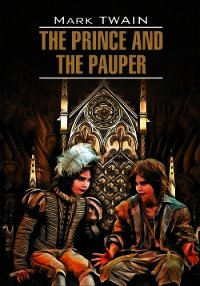Английский язык с Марком Твеном. Принц и нищий (Mark Twain. The Prince and the Pauper) - Twain Mark (читать хорошую книгу полностью .txt) 📗
It was his purpose (это было его намерением), in the beginning (в начале), to stay where he was (пробыть, где он находился), the rest of the day (остаток дня); but a chill soon invaded his perspiring body (но холод скоро вошел в его вспотевшее тело), and he was at last obliged (и он был наконец вынужден) to resume movement (возобновить движение) in order to get warm (с тем чтобы согреться: «сделаться теплым»). He struck straight through the forest (он направился напрямую через лес; to strike — бить; направляться), hoping to pierce to a road presently (надеясь пробиться к дороге вскоре; to pierce — пронзать), but he was disappointed in this (но он был разочарован в этом = безуспешно). He traveled on and on (он продвигался дальше и дальше); but the farther he went (но чем дальше он шел; to go — идти), the denser the wood became (тем гуще становился лес; to become — становиться; dense), apparently (очевидно = как казалось). The gloom began to thicken, by and by (мрак начал сгущаться вскоре), and the king realized (и король осознал) that the night was coming on (что ночь приближалась). It made him shudder (это заставило его вздрогнуть) to think of spending it (подумать о том чтобы провести ее = ночь) in such an uncanny place (в таком жутком месте); so he tried to hurry faster (так что он старался поспешать быстрее), but he only made the less speed (но он лишь сделал меньше скорость = двигался медленнее), for he could not now see well enough (так как он не мог теперь видеть достаточно хорошо) to choose his steps judiciously (чтобы выбирать свои шаги благоразумно); consequently he kept tripping over roots and tangling himself in vines and briers (следовательно, он и то и дело спотыкался о корни, запутывался во вьющихся стеблях и терновнике).
And how glad he was (и как рад он был) when at last he caught the glimmer of a light (когда наконец он уловил мерцание света; to catch — ловить)! He approached it warily (он приблизился к нему опасливо), stopping often (останавливаясь часто) to look about him (чтобы осмотреться: «посмотреть вокруг себя») and listen (и прислушаться). It came from an unglazed window-opening (он = свет исходил из незастекленного оконного отверстия; to open — открывать) in a little hut (в маленькой хижине). He heard a voice now (он услышал какой-то голос теперь; to hear — слышать), and felt a disposition to run and hide (и почувствовал расположение = желание убежать и спрятаться; to feel — чувствовать); but he changed his mind at once (но он изменил свои мысли = передумал сразу), for his voice was praying, evidently (так как его голос молился очевидно). He glided to the one window of the hut (он скользнул к единственному окну хижины), raised himself on tiptoe (поднял себя = поднялся на цыпочки), and stole a glance within (и украл взгляд = украдкой заглянул внутрь; to steal — красть). The room was small (комната была маленькой); its floor was the natural earth (ее пол был естественной землей), beaten hard by use (утрамбованной жестко использованием; to beat — бить); in a corner was a bed of rushes (в углу была постель из камыша) and a ragged blanket or two (и истрепанного одеяла или двух); near it was a pail, a cup, a basin (возле нее было ведро, чашка, миска), and two or three pots and pans (и два или три горшка и кастрюли); there was a short bench (там была короткая скамья) and a three-legged stool (и трехногий табурет); on the hearth (в очаге) the remains of a fagot fire (остатки огня из вязанки дров) were smoldering (дымились); before a shrine (перед распятием), which was lighted by a single candle (которое было освещено единственной свечой), knelt an aged man (стоял на коленях пожилой человек; to kneel — стоять на коленях), and on an old wooden box (а на старой деревянной коробке) at his side (у его бока = рядом с ним) lay an open book and a human skull (лежала открытая книга и человеческий череп; to lie — лежать). The man was of large, bony frame (этот человек был большого и костистого телосложения); his hair and whiskers (его волосы и борода) were very long and snowy white (были очень длинными и снежно-белыми); he was clothed in a robe of sheepskins (он был одет в рясу из овечьих шкур) which reached from his neck to his heels (которая доставала от его шеи до пят).
hermit [`h?:m?t], consequently [`kOns?kw?ntl?], human [`hju:m?n]
THE high hedge hid him from the house now; and so, under the impulse of a deadly fright, he let out all his forces and sped toward a wood in the distance. He never looked back until he had almost gained the shelter of the forest; then he turned and descried two figures in the distance. That was sufficient; he did not wait to scan them critically, but hurried on, and never abated his pace till he was far within the twilight depths of the wood. Then he stopped; being persuaded that he was now tolerably safe. He listened intently, but the stillness was profound and solemn- awful, even, and depressing to the spirits. At wide intervals his straining ear did detect sounds, but they were so remote, and hollow, and mysterious, that they seemed not to be real sounds, but only the moaning and complaining ghosts of departed ones. So the sounds were yet more dreary than the silence which they interrupted.
It was his purpose, in the beginning, to stay where he was, the rest of the day; but a chill soon invaded his perspiring body, and he was at last obliged to resume movement in order to get warm. He struck straight through the forest, hoping to pierce to a road presently, but he was disappointed in this. He traveled on and on; but the farther he went, the denser the wood became, apparently. The gloom began to thicken, by and by, and the king realized that the night was coming on. It made him shudder to think of spending it in such an uncanny place; so he tried to hurry faster, but he only made the less speed, for he could not now see well enough to choose his steps judiciously; consequently he kept tripping over roots and tangling himself in vines and briers.
And how glad he was when at last he caught the glimmer of a light! He approached it warily, stopping often to look about him and listen. It came from an unglazed window-opening in a little hut. He heard a voice now, and felt a disposition to run and hide; but he changed his mind at once, for his voice was praying, evidently. He glided to the one window of the hut, raised himself on tiptoe, and stole a glance within. The room was small; its floor was the natural earth, beaten hard by use; in a corner was a bed of rushes and a ragged blanket or two; near it was a pail, a cup, a basin, and two or three pots and pans; there was a short bench and a three-legged stool; on the hearth the remains of a fagot fire were smoldering; before a shrine, which was lighted by a single candle, knelt an aged man, and on an old wooden box at his side lay an open book and a human skull. The man was of large, bony frame; his hair and whiskers were very long and snowy white; he was clothed in a robe of sheepskins which reached from his neck to his heels.
'A holy hermit (святой отшельник)!' said the king to himself (сказал король себе); 'now am I indeed fortunate (теперь я действительно удачлив = мне повезло).'
The hermit rose from his knees (отшельник поднялся с колен; to rise — вставать); the king knocked (король постучал). A deep voice responded (низкий голос ответил):
'Enter (войдите)! — but leave sin behind (но оставьте грех позади = снаружи), for the ground whereon thou shalt stand is holy (ибо земля, на которой ты будешь стоять, священна)!'
The king entered, and paused (король вошел и остановился). The hermit turned a pair of gleaming, unrestful eyes upon him (отшельник повернул пару блестящих беспокойных глаз), and said (и сказал):
'Who art thou (кто ты)?'
'I am the king (я король),' came the answer (пришел = был ответ), with placid simplicity (со спокойной простотой).




